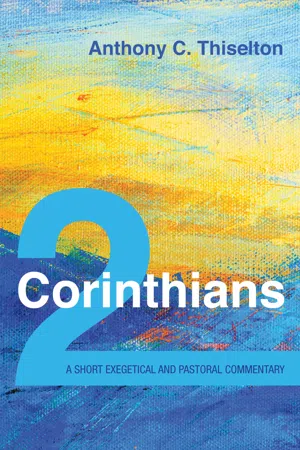![]()
PART I
INTRODUCTION
![]()
INTRODUCTION
A. Paul and Corinth
Paul had written 1 Corinthians in the early months of AD 54. But it was only partially successful. Some concerns were probably dealt with: for instance, we hear no more disputation about the resurrection of the body, or the eating of food sacrificed to idols, and references to gnosis and wisdom become much less common. The cause of the new troubles entered Corinth from without.
As Paul Barnett notes, the Corinthian church proved to be the most demanding of the churches Paul had oversight of. In 1 Corinthians Paul writes objectively and confidently, while 2 Corinthians reveals a range of emotional extremes. But in both letters he is forced to defend his doctrines.
It is unfortunate that because Romans is more systematic and often easier to follow, historically it has put the Corinthian epistles in the shade, although justification by sovereign grace is not absent, and is thoroughly applied. “What do you have that you did not receive?” Paul asked the church in Corinth; “and if you received it, why do you boast as if it were not a gift?” (1 Cor 4:7). And in their way, the Corinthians epistles are no less theologically rich and deserving of attention.
B. Roman Corinth
No introduction to 2 Corinthians, however short, would be adequate without a careful explanation of the distinctive features of the city of Corinth.
1. A Prosperous, bustling, international community
Corinth was one of the most vibrant, exciting, and challenging cities in the whole of the Greek world in Roman times. It was situated on a narrow neck of land in Greece with a harbor on each side of it. On the east side, the harbor of Cenchreae faces across the sea to the Roman province of Asia and Ephesus. On the west side the port of Lechaeum faces Italy and ultimately Rome. Yet at the narrowest point of the isthmus the distance between the two seacoasts is less than six miles, or barely nine km. Corinth was thus a major center for international east-west trade.
This favored location for east-west trade was matched by an almost equally favored position between northern and southern Greece. To the north lay the Province of Achaea, and yet further north, Macedonia, which included Philippi and Thessalonica. To the south lay the Peloponnese, down to the shores of Cape Malea. Corinth stood at the crossroads or intersection between north and south and between east and west for business and trade. In Paul’s time it had become a busy, bustling, cosmopolitan business center. By comparison, Athens might have seemed a slumbering university city, dreaming simply of its greater past.
Those who traded between Asia and the west preferred to use the two port facilities of Corinth rather than travel by ship around Cape Malia, where winds and tides were often hazardous off the southern shores of Greece, especially in winter. If they used light cargo ships, sailors or traders could transport even the ship on rollers over the paved road, called the diolkos, that linked the two harbours. Alternatively, they could unload cargo at one port and reload it at the other. In either case, toll fees or carriage charges swelled the income of Corinth and its officials.
Corinth inherited a large income from tourism, business, and manufacturing. Tourists flocked to Corinth, not least for the famous Isthmian Games, which were held every two years. Second only to the Olympic Games, the Isthmian games were among the three great games-festivals of the whole of Greece. They attracted participants, spectators, and other visitors from all corners of the Empire between Rome and the east. Archaeologists have recovered coins that witness to the range of international visitors who came to the Games.
When he first arrived in Corinth, Paul would probably have seen whatever booths and stands remained from the Games of AD 49, and they would have been in full swing during his ministry there in AD 51. By the middle of the first century, the Games had expanded to include a multiplicity of competitive and sometimes spectacular events. In addition to chariot races, athletic events, competitions in trumpet, flute, and lyre, poetry readings, and other events, Corinth or Isthmia had, unusually, introduced athletic contests for women, and the apobatikon, in which a rider would leap from one team of horses to another. During this period Corinth managed the Games and reaped a vast income from them.
In addition to competitors and spectators, business people, traders, and especially individuals with entrepreneurial skills or hopes visited what constituted a hub of opportunity for new commercial contacts and ventures, new possibilities of employment, quick person-to-person agreements or transactions, and a large cosmopolitan pool of potential consumers. These visitors brought money to rent rooms, to buy necessary or exotic products, and to hire dockers, porters, secretaries, accountants, guides, bodyguards, blacksmiths, carpenters, cooks, housekeepers, and both literate and menial slaves. They sought to employ or to hire managers, craftsmen, and people who could repair wagons, tents, ships, or chariots. This list conveys a good idea of the composition of the average Pauline church community.
Paul would have spent many long, hot hours in a workshop, probably close to the Lechaeum Road or on the north, sun-drenched side of the Forum or Agora. Archaeologists have excavated shops or workshops of some 13’ x 8’, some with sleeping accommoda...
